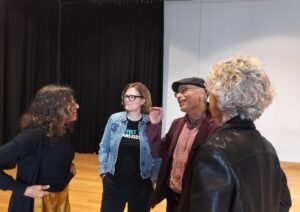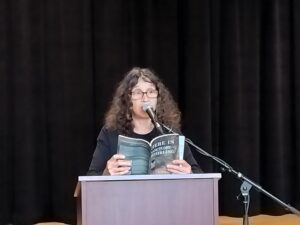Last weekend I had the privilege of reading at the Northampton Center for the Arts with two awesome poets, Lindsay Rockwell and Mary Warren Foulk, as part of the Northampton Literary Walk. We were the intro act to a film by Chris Gentes entitled What is Poetry, where four other accomplished local poets–all worth checking out (Michael Favala Goldman, Howie Faerstein, Tommy Twilite, and L.D. Greene) discussed their work and their process.

Later, on a text thread, one poet remarked, I often feel so raw and exposed after a reading. Maybe that’s the nature of the beast.
Yes, vulnerability is the nature of the beast. Reading your work out loud is kind of like undressing, putting one’s heart and words on the dissection line, showing all the flaws in your imperfect body.
Because we go through life with a certain amout of polish–a veneer we lather on as we learn to relate to each other, as impermeable as a long fuzzy sweater and a pair of jeans, we take care in how much we reveal to others. Even in our closer circles of friends and family, I, at least, take great pains to project an aura of strength and competence.

But when we share our work with others, especially in a public reading setting, where even the most compassionate audience cannot divorce themselves from their own need to discern what they’re hearing into what’s pleasing to them and what isn’t, it’s hard not to feel judged.
For me, this judgment has two components:
Is my writing good? Am I a real writer or an impostor? I especially worry about this with more academically oriented audiences whose banter about other writers often edges over into a line of snobbery. I also feel like an impostor when I’m among people who’ve had significantly more success than I have, often due to a far greater level of skill that I can only admire and covet.
The second question goes even deeper into the heart of vulnerability. In fact, it feels like one of those chasm-like questions whose words only graze the edges.
Do you feel me?
We write, even when it’s flawed, from our deepest selves, that raw place inside that’s aching to be heard, validated, and understood. Metaphorically undressing and exposing that spot, we often hide as we parade our polished selves through our daily lives, can be terrifying. Especially in a capitalistic society that values writing more as a commodity than an art–but that’s a topic for another post.
One of the most significant things I’ve done in the past few years is to share more of my writing with my parents who’ve always loved me, but really only know the polished self I choose to show them. Do they feel me? Not always, though I’ve appreciated that they’ve taken the time to try. When she read my short story collection Immigrants, my mother was pretty up front about saying she liked some stories better than others. But she took the time to read the book again, and said, I saw how well you put it together. And when she read my not-yet-published memoir, Imperfect Pitch, which was much harder for me to share because it was about our family and not always nice, she said, I think this book would be important for people in our family to read. It gave me more understanding.
These comments made all the vulnerability risk worth it. And while I’ll still parade my polished competent self in family and other settings, being felt and acknowledged, even when not as fully as I might like, has made me a little braver about reading, and more amenable to finding moments to let the rawness shine through.
